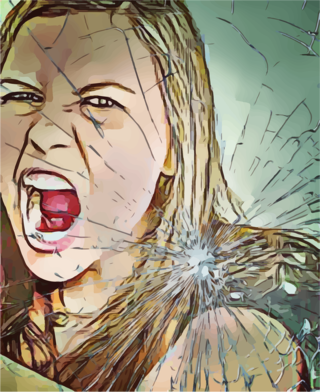Cognition
How to Keep Victimization From Defining Your Life
These tips will help you avoid developing a victim mindset.
Posted October 11, 2021 Reviewed by Davia Sills
Key points
- Bad things happen; how they affect your life depends on your perception.
- A victim mindset, if not corrected, can lead to hopelessness.
- Look for the silver lining when you’ve been victimized.
- There is usually a lesson to be learned from unfortunate events.

In recent articles, I’ve written about negative self-talk and core beliefs, both of which led me to start thinking about how being victimized can create a limiting belief. One that can hold you back from having a fulfilling life.
As I did my research, I came across some terms that define people who wear their victimhood on their sleeves, such as victim personality, victim mentality, and victim complex. For the most part, these are people who are married to their victim status, so much so that they will seek situations that make them feel persecuted in order to gain sympathy, avoid responsibility, or manipulate others. This feels more like narcissism to me and is not the condition I want to address.
The victim mindset I’m writing about is the result of having experienced trauma, abuse, betrayal of trust, or perhaps a series of adverse occurrences. People who have been severely victimized and suffered tremendous negative consequences sometimes approach life with true trepidation.
Don’t allow a bad situation to change your state of consciousness.
If you’ve suffered multiple unfortunate events, it can make you feel like you are stuck in a streak of bad luck or have a dark cloud hanging over you, and that more injury and damage are on the way. This is the kind of thinking that led to the formation of Murphy’s Law which states: "Anything that can go wrong will go wrong."
“To stop being a victim, you have to stop thinking like a victim.” —Asma Naqi
Sometimes bad things happen to us that are completely out of our control. I’ve been a victim, so has everyone, and how it affects your life will depend on how you perceive it.
When I was playing football in high school, my leg was badly broken by another player who violated the rules against clipping. He tackled me from behind and below the knee, which broke both the bones in my lower leg. I almost lost my leg. I had two surgeries and was in the hospital for two weeks, after which I spent six months in a cast, plus I have endured lifelong knee pain.
Despite all that, I never blamed the other player; instead, I found several benefits. First, it got me honorably out of playing a game I didn’t like (quitting would’ve gotten me ostracized and ridiculed, which is terrifying to teenagers). Second, because I was unable to take Physical Education classes, I was forced to take a Home Economics class in cooking (which at first seemed like more bad luck), but then I met a cute female classmate whom I started dating, and it introduced me to the joy of culinary arts, which has stayed with me to this day.
I was laid off from a writing job because the advertising agency lost a major client and couldn’t afford to keep me. At first, I was pretty upset, but it motivated me to become self-employed, so I never had to worry about getting fired again.
My home was burglarized shortly after moving into a neighborhood that I perceived as being safer than my previous one. Instead of blaming the neighborhood, I installed better locks and an alarm system. It also motivated me to convert my carport (which was the vulnerable part of the house) into a home office, which has become my favorite room.
Years earlier, in my previous neighborhood, my car, while legally parked on the street, was damaged by a hit-and-run driver in the middle of the night. I wasn’t happy about having to pay the hefty deductible to my insurance company, but then I ended up with a better car.
I had a mild injury for which I was prescribed an antibiotic, to which I had a serious adverse reaction that put me in the hospital for a full week and rendered me unable to walk for two months. Rather than see that as bad luck, it motivated me to start eating healthier and working out more.
“It's not what happens to you, but how you react to it that matters.” —Epictetus
Initially, I was pretty upset about all of these events, but rather than let them turn me into a chronic victim, I found the silver linings. There are always silver linings if you are willing to look for them.
Each of these incidents seemed beyond my control, and they were (based on my knowledge at the time), but each one provided a life lesson—that could prevent it from happening again if I paid attention. In hindsight and maturity, I can see that: If I were true to myself and didn’t cave to peer pressure, I would never have played the dangerous game of football; if I were more confident in my writing ability, I would never have accepted the ad agency job; if I knew about situational awareness, I might have recognized the need for a burglar alarm sooner; and if I had read the warning sheet provided by the pharmacist with the antibiotic, I would’ve recognized the symptoms of the adverse reaction sooner and not gotten as sick. Hindsight, of course, is 20/20, and through these problems, I acquired some wisdom.
An unchecked victim mindset can lead to hopelessness.
One of the problems of having a victim mindset is that it can become self-perpetuating if you aren’t learning from it. Worse can be the fear of experiencing another ordeal. If it makes you want to hide from life and wrap yourself up in a safety bubble, it can lead to a sense of hopelessness that prevents you from moving forward.
If a victim mindset is ruling your life, it is rooted in your perception. I heard a fable many years ago that drives this point home. Two Buddhist monks were walking back to the monastery when they came to a river crossing. Standing at the edge of the water was a beautiful young woman in fine clothing. The ford was too deep for her to cross without ruining her clothes, and she was clearly distressed about what to do.
The older of the two monks picked her up and carried her across the river and set her down on the other side. The woman thanked him graciously; he nodded and went on his way. The younger monk caught up, and they continued their journey.
As the miles passed, the younger monk became visibly more and more agitated, until finally the older monk stopped, looked at him, and asked, “What is troubling you?”
The younger monk sputtered angrily, “We’re not allowed to look at women, talk to them, or touch them, and yet you carried that woman across the river!”
The older monk looked peacefully at the younger man and replied, “Are you still carrying that woman? I left her back at the crossing.”
Here are some things you can do to prevent developing a victim mindset:
1. Look for any life lessons you can learn from the event.
2. Find the silver linings and how your life is now better.
3. Take responsibility for what you could’ve done to prevent it, learn from it, and move on.
4. Feel the pain. Don’t ignore it. Acknowledge it—then move on.
5. Leave the past in the past; dwelling on things you cannot change only leads to depression.
6. Live mindfully; stay in the present; work on your goals and purpose.
7. Surround yourself with supportive friends and family, but don’t milk their empathy dry.
8. Become resilient, and bounce back into life!
I’ll close with a quote from Orison Swett Marden, who founded SUCCESS magazine in 1897, “A strong, successful man is not the victim of his environment. He creates favorable conditions. His own inherent force and energy compel things to turn out as he desires.”




